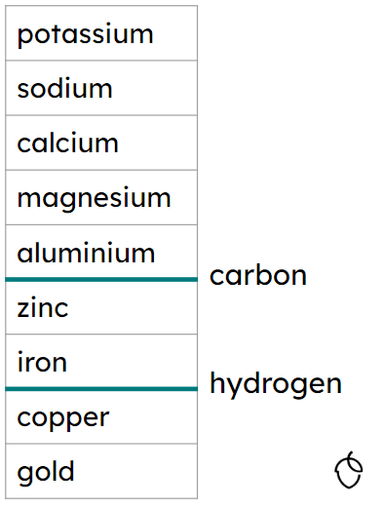Myths about teaching can hold you back
- Year 11
- AQA
- Higher
Extraction of metals by reduction
I can explain how carbon can extract some metals from metal oxides by heating.
- Year 11
- AQA
- Higher
Extraction of metals by reduction
I can explain how carbon can extract some metals from metal oxides by heating.
Lesson details
Key learning points
- Unreactive metals are often found in the earth as pure metal.
- Metals that are less reactive than carbon can be extracted by heating their oxides with carbon.
- A metal oxide is said to be reduced by carbon because the metal oxide loses oxygen.
- Carbon is oxidised when it reacts with a metal oxide because it gains oxygen to form carbon dioxide.
Keywords
Metal oxide - A metal oxide is a compound containing metal and oxygen atoms chemically bonded together.
Oxidation - Oxidation is a type of reaction in which a substance gains oxygen or loses electrons.
Reduction - Reduction is a type of reaction in which a substance loses oxygen or gains electrons.
Ore - An ore is a rock that contains metals or metal compounds. Metal can be extracted from its ore.
Redox reaction - A redox reaction is a reaction where both reduction and oxidation occur.
Common misconception
Thinking that oxidation and reduction are only to do with the loss and gain of oxygen.
Oxidation is the loss of electrons or the gain of oxygen. Reduction is the gain of electrons or loss of oxygen.
To help you plan your year 11 chemistry lesson on: Extraction of metals by reduction, download all teaching resources for free and adapt to suit your pupils' needs...
To help you plan your year 11 chemistry lesson on: Extraction of metals by reduction, download all teaching resources for free and adapt to suit your pupils' needs.
The starter quiz will activate and check your pupils' prior knowledge, with versions available both with and without answers in PDF format.
We use learning cycles to break down learning into key concepts or ideas linked to the learning outcome. Each learning cycle features explanations with checks for understanding and practice tasks with feedback. All of this is found in our slide decks, ready for you to download and edit. The practice tasks are also available as printable worksheets and some lessons have additional materials with extra material you might need for teaching the lesson.
The assessment exit quiz will test your pupils' understanding of the key learning points.
Our video is a tool for planning, showing how other teachers might teach the lesson, offering helpful tips, modelled explanations and inspiration for your own delivery in the classroom. Plus, you can set it as homework or revision for pupils and keep their learning on track by sharing an online pupil version of this lesson.
Explore more key stage 4 chemistry lessons from the Using Earth's resources unit, dive into the full secondary chemistry curriculum, or learn more about lesson planning.

Licence
Prior knowledge starter quiz
6 Questions
Q1.Where are more reactive metals positioned on the reactivity series?
Q2.What is the product of a reaction between sodium and oxygen?
Q3.What is scientific term for a rock that contains metals or metal compounds from which we can extract metal?
Q4.Which of the following statements about the position of metals in the reactivity series are correct?
Q5.Which substance has been oxidised in the following reaction?
Magnesium + iron oxide → magnesium oxide + iron.
Q6.Which substance has been reduced in this reaction?
Magnesium + iron oxide → magnesium oxide + iron.
Assessment exit quiz
6 Questions
Q1.What is the name for a type of reaction in which a substance loses oxygen or gains electrons?
Q2.Which of the following methods can we use to extract platinum?
Q3.Which statements about the following reaction are correct?
Zinc oxide + carbon → carbon dioxide + zinc.
Q4.In the following reaction, which substance has been oxidised and which substance has been reduced?
Lithium + copper oxide → lithium oxide and copper.
Q5.How can aluminium be extracted from aluminium compounds in an alumumium ore?

Q6.Why can we extract zinc from zinc ore by heating with carbon, but not to extract magnesium from magnesium ore?



